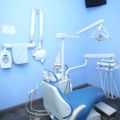HOW TO CORRECT COMMON DENTAL IMPLANT PROBLEMS?

Once the implants fuse with the bone, a crown can be positioned at the site of missing tooth. While most of the implants are successful, there are some potential problems that require your attention. Don't worry though; they can be easily taken care of by a dental expert.
Issues during the Healing Period
Implants work properly if they are surrounded by healthy teeth and gum tissues. There are a number of factors that can impact the ability of an implant to stay attached to the bone. There’s a possibility of an implant becoming loose during the healing period. Generally, there is no infection or pain when this happens. The quality of bones may attribute to dental implant problems. This is quite common for implants positioned on extraction sites or near molars in the upper jaw.
Implants in Use
Certain problems may develop when the implant is in use during the post-healing period. The implant may become loose if the bone is not able to handle the force being applied. As a remedy, your dental expert may remove your implant and allow the bone to plug in the region. This surgical process may involve stiches and bone grafting, and you may be put under anesthesia as well. In case you have lost your tooth due to gum disease, you are at a higher risk of bone loss near the implant.
Another reason could be the unwanted space between the implant and the surrounding teeth, since the implant might not be as perfect as the previous tooth. It can cause food to get stuck between natural teeth and the implants. When the implant becomes infected, it can lead to more severe dental implant problems. There is a condition called peri-implantitis, which causes bone loss and generally requires removal of the implant.
Structural Problems
There are multiple components in an implant: the prosthesis (which may be a denture, bridge, or crown that serves as a tooth replacement), the abutment that holds the dental work in place, and the fixture placed into the bone. Although the abutment is made of rigid materials like zirconia, titanium or gold, it may rupture. So is the case with the screw that attaches the abutment to implant body. Any dental work made of ceramic or metals can tear down. In case your implant fractures, your dentist will evaluate the extent of damage and the kind of treatment that's required. Individuals may also end up harming the crown on their implant by continuously grinding their teeth.
How to Manage Your Implant
While dental implants are mostly long-lasting, it is important to know that it may not last a lifetime. Just like our natural tooth, an implant can also experience wear and tear, excluding cavities. Before making any decisions, it is recommended that you consult with your dentist and make sure that realistic expectations are set. The costs of dental implants tend to vary according to the region of implantation. Knowing these details beforehand will help you prepare better.
Other articles and publications:
Articles and publications of other companies:
- +1 (914) 365-7438
- 227 N Central Ave
- www.guerrinodentistry.com



